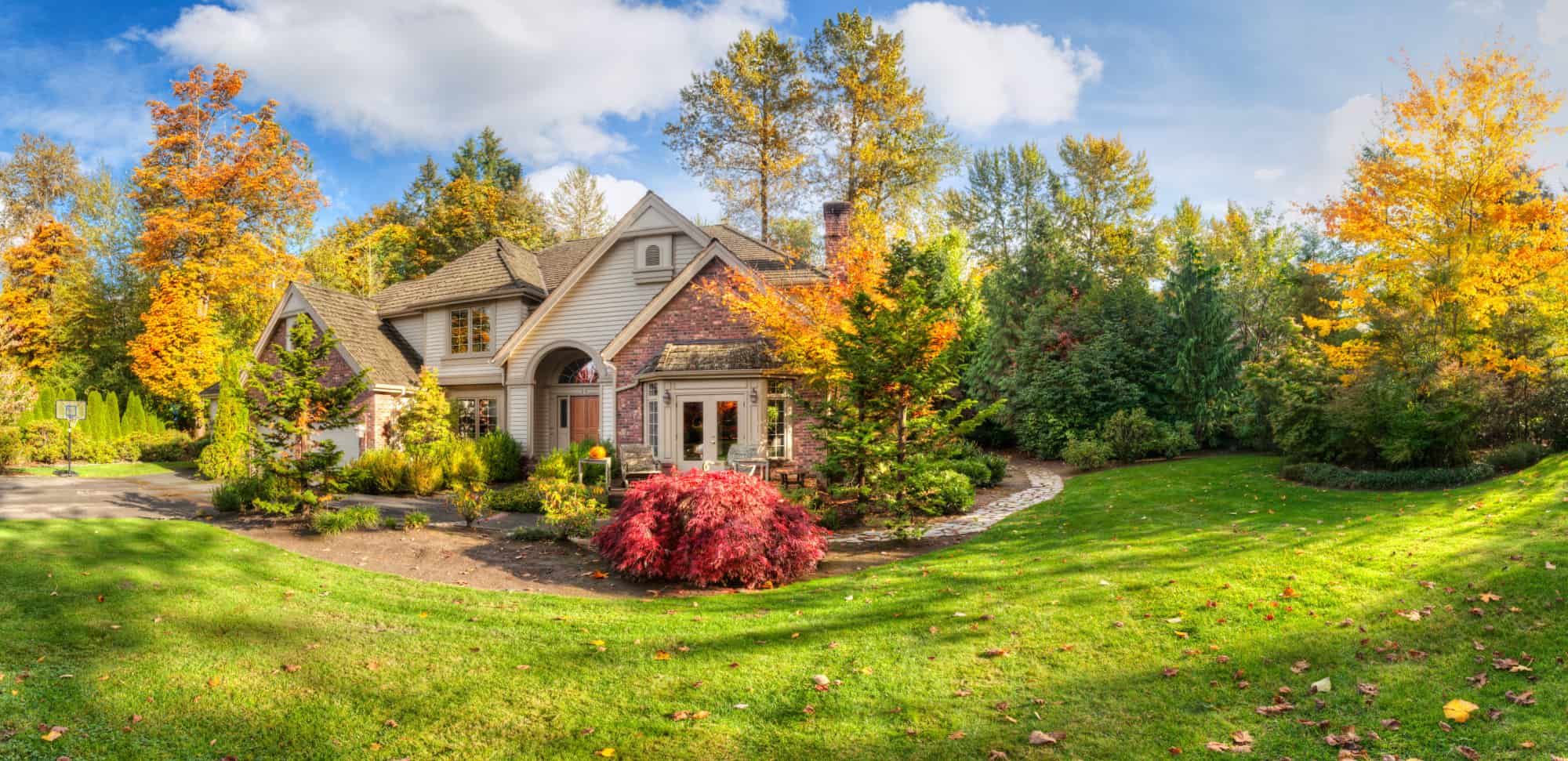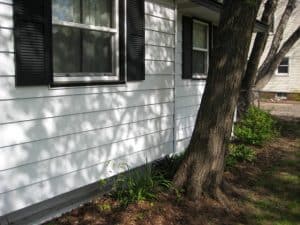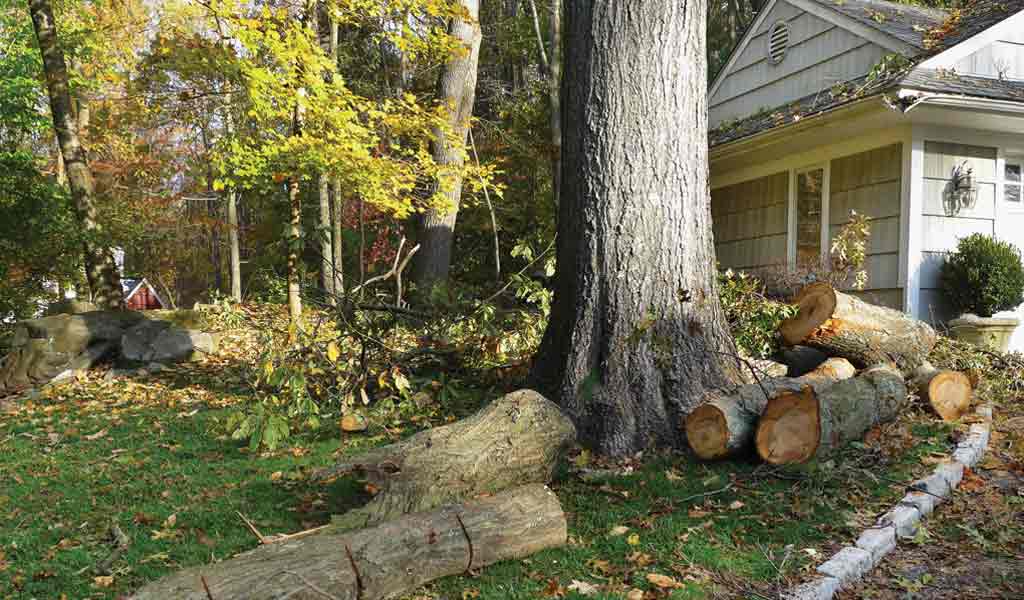Bought a House With Trees Close to the Foundation? Here’s What You Should Know

Bought a House with Trees Close to the Foundation?
What You Should Know
Buying a new home is one of the most exciting things you can experience as an adult. Some even say it’s more exciting than the first kiss with their soulmate.
Losing your brand new house or spending thousands to repair it because a tree damaged your home is utterly heartbreaking.
There are so many important steps when it comes to looking for and buying a home. You need to make sure it has enough room for your family to live comfortably. Is the neighborhood safe for your kids? Does the plumbing need to be replaced?
Sometimes other vital things slip through the cracks.
Checking to make sure the trees on your new property won’t eventually damage your home should definitely be included on the checklist of important questions to answer before you sign that final paperwork.
A house with trees is a beautiful sight. You need to make sure to do your homework to protect both your home and the natural beauty around it.
Why is a House with Trees a Good Investment?
When planted properly, trees not only provide a gorgeous view around your home, but also have some practical uses.
– Cuts down on energy use – Shade from older trees can cut down annual air conditioning costs by about 56 percent each year. Evergreens, trees that don’t lose their leaves in the winter, help insulate homes by blocking the wind. This saves homeowners about 6 percent of their annual heating bill.
– Natural privacy barrier – Most counties have rules about how tall a fence can be. Two-story homes, therefore, have no real barrier to protect the upper story from the neighbors. A nice, lush tree will block the view so you can safely enjoy your upper balcony without worry.
– Natural sound barrier – Homes near highways are noisy. Putting a line of trees near the fence line will help reduce car noises by as much as half.
How to Tell If the Trees Are Too Close to the House

– Trees should be planted anywhere from 15 to 30 feet from the house
– Any tree 5 to 10 feet from the home should be considered a potential hazard
– Large tree branches shouldn’t hang directly over the house.
– Tree branches shouldn’t drag across the windows/siding in the wind.
– Trees shouldn’t be directly on the fence line.
What Happens When a Tree Is Too Close to the House?
For all their benefits, trees have certain growing requirements. Ignoring them will eventually wind up costing thousands of dollars in damages.
Some of the most common problems include:
Attracting termites – Moisture from tree roots can encourage a termite infestation. Generally termites prefer dead wood; dying trees are a buffet for them. Once they’re done with the tree, they will migrate to your house.
Damage to building foundation – Large trees, like willows, have aggressive root systems that will go through anything to find moisture. They might not burrow through the concrete itself, but the shifting ground under the slab will eventually cause cracks.
Tilting – Damage to the foundation can make rooms within the building tilt. This shifting will cause cracks in your drywall and flooring.
Tripping hazards – Trees like camphor have huge roots. Planting them beside a sidewalk looks pretty, but the roots will always cause the sidewalk to bulge.
Breaking or blocking pipes and sewer lines – Tree roots seek out any and all water sources. Larger roots can crush old pipes to get to the water. Even cute fruit trees can grow roots that will completely clog older sewer lines if they find a way to get in.
Roof/window/siding damage – Branches hanging over the roof always pose a threat. Even if the tree seems fine, they’ll still drop branches eventually. Not to mention, gathering tree debris will cut down on your roof’s life expectancy. Any branches touching the side of the house can potentially rip off siding or break windows in high winds.
Falling damage – Winter storms are getting more aggressive. Saturated soil doesn’t hold tree roots well. When combined with powerful winds, trees can fall over. If the tree is too close, it can take out your entire home, or your neighbor’s house.
Aggressive Trees to Lookout For
To keep your home safe, these problematic trees shouldn’t be within 50 to 150 feet of the foundations or water lines.
– Weeping Willow
– Cottonwood
– Silver Maple
– Norway Maple
– Black Locust
– American Elm
– White Pine
– Quaking Aspen
How Do I Cut Down a Tree That’s Too Close to My House?

To make sure your home survives with no damage during the removal process, it’s best to let a professional arborist handle the heavy lifting.
Here are the steps of tree removal so you know what to look forward to during the process:
– Check to make sure you don’t need a permit to remove the tree. Each state and county are different, so it’ll take a little searching to find the right information.
– Tree removal starts by cutting off the lower branches so the top branches can come down easier.
– Large limbs will need to be lowered carefully by a rope once cut from the tree.
– The tree trunk will be removed in small sections starting at the top and lowered by a rope.
– The tree stump and roots will need to be removed to prevent termite infestation.
Protecting Your House is Worth the Effort
No one wants to wake up to a tree in their bedroom. Taking the time to assess the trees near your home will ensure your family’s safety for decades.
But you can’t do it on your own. Your new home is too precious to lose in an accident during tree removal.
Keeping a house with trees is important to not only the look of your neighborhood, but also the environment. You don’t want to damage either.
That’s why we’re here to help.
Feel free to look through our blog for more information about tree removal and to learn which trees are best for your new property.



You must be logged in to post a comment.